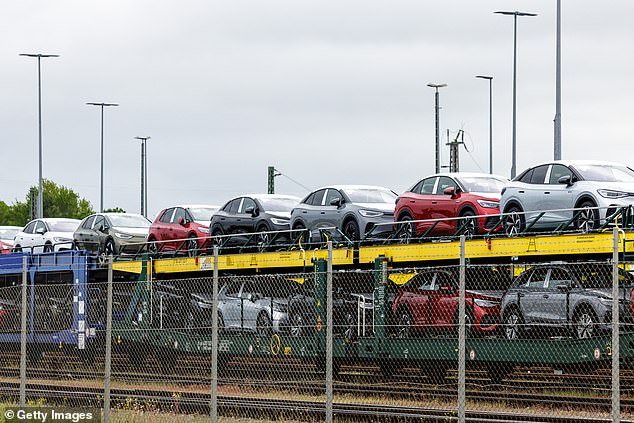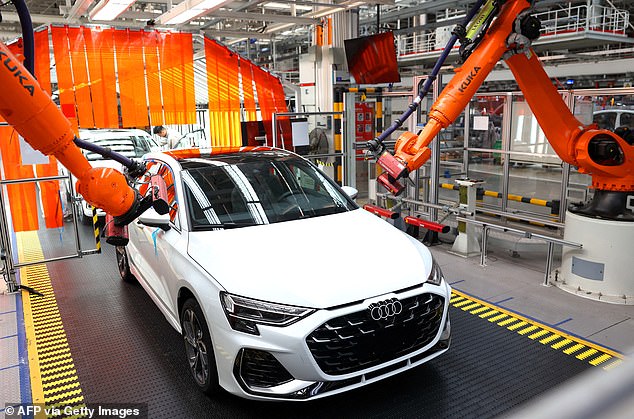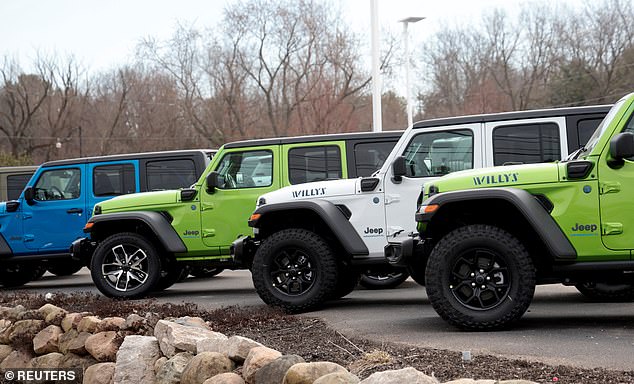- EXPLORE FURTHER: How Trump's Tariffs Might Encourage More Americans to Purchase Electric Vehicles
- PODCAST: Trump's 'Freedom Day' Tariffs, along with an unexpected push for the death penalty in the Luigi Mangioni case. Tune into Welcome to MAGAland here.
Volkswagen has 37,000 vehicles stranded at U.S. ports due to tariff chaos.
Audi, which is part of the world's second-largest automotive manufacturer, has acknowledged being in a high-stakes waiting period due to President Donald Trump. Trump's 25 percent tax on cars from abroad .
The impacted vehicles reached the United States on the very day when President Trump declared these extensive tariffs. Currently, they remain unused as Volkswagen contemplates its subsequent steps. Executives reportedly anticipate either a reversal of the president’s decision or an opportunity to renegotiate for a reduced tariff rate.
This is the newest move by Volkswagen against President Trump’s policies. The company plans to include a new ‘import fee’ on car price tags to inform buyers about tariff-induced cost increases—clearly aimed at critiquing the current administration’s stance on trade.
The charge will be listed next to typical fees such as taxes and additional costs for amenities including heated seats or Apple CarPlay.
The new new 'import fee' will be placed alongside sums for other components such as taxes, and expenses related to features like heated seats and CarPlay.
Volkswagen's choice to delay deliveries highlights the widespread impact on the worldwide automotive industry. However, Audi finds itself squarely within the range of President Trump’s tariff measures.
The Q5 SUV, which is the best-selling model of this luxury brand, undergoes final assembly in Mexico. Nearly all other vehicles within the brand’s range are shipped from Europe, thus qualifying their complete product line for tariffs.


In a declaration to SolusiKaki.com, the firm voiced opposition to the tariffs and expressed hope that Trump would engage at the negotiation table to eliminate these taxes.
A representative from Volkswagen stated that customers will not notice an instant effect. At present, the firm holds around 37,000 vehicles in stock within the U.S., which should suffice to maintain dealership supplies for approximately two months.
'We share the assessment of most experts a representative from Volkswagen stated to solusikaki.com that both US tariffs and retaliatory tariffs will adversely affect economic expansion and wellbeing in the US and other regions,
'The whole car sector, international supply networks, businesses, and consumers will face the adverse effects.'
President Trump has consistently maintained that tariffs would encourage businesses to invest in manufacturing within the USA. However, Volkswagen stated that these taxes pose a threat to their business strategy based in the United States.
The representative highlighted that Volkswagen has committed over $14 billion to U.S. manufacturing facilities and supports numerous jobs for plant workers. The corporation operates a massive facility in Chattanooga, Tennessee, which churns out the mid-sized Atlas and Atlas Cross SUVs along with the electric ID. 4.
Even with its US factory, Volkswagen still stands as one of the most vulnerable carmakers in the country since the majority of vehicles sold in the U.S. are produced in Germany and Mexico.
Volkswagen representatives stated, "We share comprehensive updates with our dealership network regarding every facet of the business, and we aim to maintain complete transparency as we navigate through this period of uncertainty."


The messages may vary each day depending on the situation. Our priority is always the well-being of both our dealers and customers. After assessing the effect on our operations, we will communicate our approach to our dealers.
Readers of Daily Mail appeared unimpressed by the automobile firm's label caution.
'Go ahead as you wish,' a commentator replied to the German company.
Noone I know who owns one intends to purchase an additional one.
However, VW saw a significant rise of 15 percent in their sales figures within the US in 2024, capturing more than 4 percent of the country’s automotive market share.
Companies are hurriedly assessing the extent to which these tariffs will impact their profits, stock levels at dealerships, as well as their future manufacturing strategies.
Last week, Stellantis — the company behind Jeep, Dodge, Ram, and Chrysler — declared it would temporarily lay off 900 workers and halt production Across several plants as it processed its tariff reply.
Ford, with an above-normal accumulation of cars on its lot, announced it would provide employee discounts to buyers. GM remains ramping up US-based production of its high-cost pickups.


Toyota announced that it will cover the costs of implementing new parts distribution systems in the U.S., though they have not provided details about potential price adjustments. Meanwhile, Mercedes-Benz stated that they do not plan to modify their car prices in April.
Land Rover is also pausing shipments to the US.
Meanwhile, President Trump has constantly criticized tariff policies organized by other nations.
However, when international governmental leaders contact the President to advocate for modifications in the tax policy, they encounter a discrepancy with reality.
'If they impose a 39 percent fee on us, we will charge them 20 percent,' stated President Trump while introducing his reciprocal tariff policy aimed at European nations.
So basically, we're charging them around fifty percent.
Many nations disagree with Trump's figures.
The World Trade Organization suggests that the aggregate tariff rate applied to American goods coming from the European Union stands somewhat above 4.8 percent.
In 2023, the bloc reportedly collected approximately $3 billion in tariff income from U.S. products. In contrast, the United States noted $7 billion.
Read more